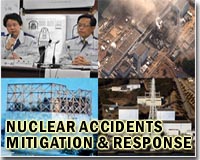| . |  |
. |
Tokyo (AFP) March 19, 2011 Japan deployed a fleet of fire trucks day and night to cool a quake-hit nuclear plant to avert a catastrophe in what the head of the UN International Atomic Energy Agency called "a race against time". Tonnes of water were used to douse overheating fuel rods at the Fukushima No.1 power station, 250 kilometres (155 miles) northeast of Tokyo, which suffered critical damage in the massive earthquake and tsunami that rocked Japan on March 11. Japan's nuclear safety agency on Friday raised the Fukushima crisis level to five from four on the international scale of gravity for atomic accidents, which goes up to seven. The decision puts Fukushima on the same level as the 1979 accident at Three Mile Island in Pennsylvania and makes it the worst ever in Japan. "This is a very grave and serious accident," visiting IAEA chief Yukiya Amano said after meeting Prime Minister Naoto Kan. "So it is important that the international community, including the IAEA, handles this jointly. Especially cooling (the reactors) is extremely important, so I think it is a race against time." An IAEA expert in Vienna said the situation at the plant had not worsened "significantly" over the past 24 hours. Five specially equipped fire trucks from the Tokyo Fire Department doused seawater in a 20-minute operation early Saturday to cool fuel rods at the power station, a department official said. On Friday afternoon, six fire trucks from the Self-Defence Forces (SDF) had unleashed some 50 tonnes of seawater on one of the troubled reactors at the plant. A defence ministry official told AFP they were targeting the number-three reactor in the afternoon operation. The Tokyo Fire Department trucks, including a vehicle which can pour water from a height of more than 20 metres (over 65 feet), began the latest operation at 0:30 am (1530 GMT Friday). The department said it was to conduct another operation at noon Saturday. Last week's twin disasters knocked out the plant's reactor cooling systems, sparking a series of explosions and fires. Authorities have since struggled to keep the fuel rods inside reactors, and fuel storage containment pools, under water. If they are exposed to air, they could degrade further and emit large amounts of dangerous radioactive material. On Thursday, four twin-rotor CH-47 Chinook military helicopters ran the first mission to empty large buckets that hold more than seven tonnes of water each onto the facility. Five special SDF fire trucks later joined the effort. The fuel rod pools at reactors three and four may be boiling and are not fully covered by roofs that would reduce radiation leaks. Fluctuating radiation levels at the complex have hindered the cooling operation, repeatedly sparking delays. Chief government spokesman Yukio Edano put radiation levels Friday at about 100 microsieverts, and said there was no immediate threat to human health. A single dose of 1,000 microsieverts -- one sievert -- causes temporary radiation sickness such as nausea. Officials at plant operator Tokyo Electric Power Co (TEPCO) said they believed the water-dousing efforts were bearing fruit -- in the face of scepticism from some international experts. "When we poured water, we monitored steam rising from the facility. By pouring water, we believe the water turned down the heat. We believe that there was a certain effect," a TEPCO spokesman told reporters. Workers were also continuing with the crucial task of trying to restore power lines, Edano said, in a bid to reactivate the plant's crippled cooling systems. The nuclear safety agency said early Friday that TEPCO had managed to get a line from a regional power firm into the plant site which would allow it to restore the cooling system. "The power cable is near. We would like to speed up this operation as we can then use it to speed up the rest of what we have to do," Edano said. The 9.0-magnitude quake, the biggest on record to strike Japan, knocked down electricity pylons used to supply power to the plant. Paving the way for a more direct role by the US military, the Pentagon said it had sent a team of experts to evaluate what assistance US forces could provide to the effort to control the situation at the Fukushima complex. The French nuclear authority has said the disaster equated to a six on the seven-point scale, ranking the crisis second only in gravity to Chernobyl. si-oh-kdf-fz-sps/pst
Share This Article With Planet Earth
Related Links Bringing Order To A World Of Disasters A world of storm and tempest When the Earth Quakes
 UN atomic watchdog under fire over role in Japan crisis
UN atomic watchdog under fire over role in Japan crisisVienna (AFP) March 18, 2011 The IAEA has come under fire over its response to the nuclear crisis in Japan, with critics saying it has been slow to act and provide accurate information about the unfolding catastrophe. But observers argue the fault lies more in the largely toothless mandate of what is frequently referred to as the UN's atomic "watchdog". Indeed, the International Atomic Energy Agency's statutes leave ... read more |
|
| The content herein, unless otherwise known to be public domain, are Copyright 1995-2010 - SpaceDaily. AFP and UPI Wire Stories are copyright Agence France-Presse and United Press International. ESA Portal Reports are copyright European Space Agency. All NASA sourced material is public domain. Additional copyrights may apply in whole or part to other bona fide parties. Advertising does not imply endorsement,agreement or approval of any opinions, statements or information provided by SpaceDaily on any Web page published or hosted by SpaceDaily. Privacy Statement |